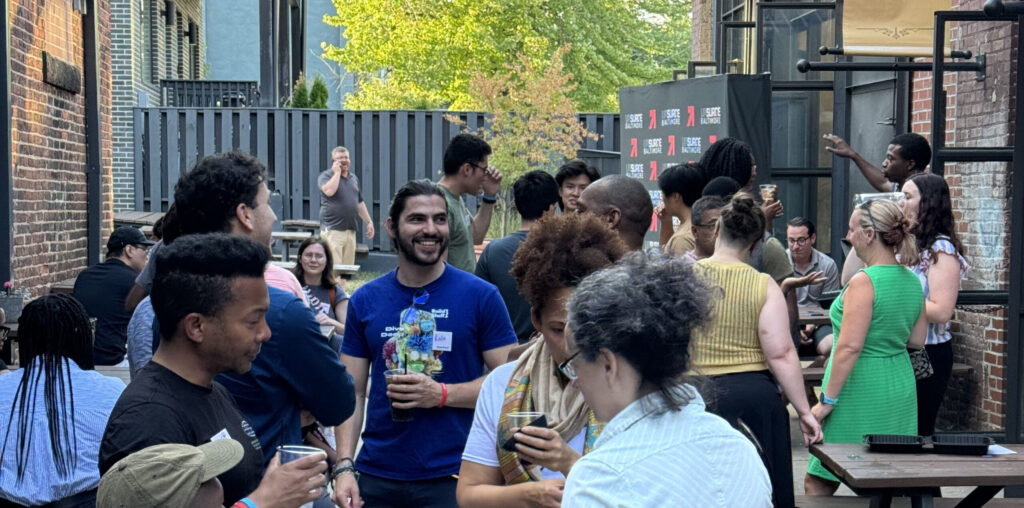The biggest boosters are relentlessly bullish on Baltimore’s tech and innovation scene, and there’s data to back them up. But it’s always difficult to separate the “narrative” from the truth.
That’s true of any city or metro region, but in Baltimore, the stakes feel higher. Its reputation remains inseparable from a TV series that turned its endemic segregation, institutional chaos and violent crime into endless critical acclaim. Those invested in reversing this narrative have many tools at their disposal, but deploying them risks reinforcing the same problems they say they want to overcome.
This dynamic pervades the city’s tech and innovation scene, whose biggest boosters believe we can build an equitable, opportunity-rich economy that both leverages and goes beyond traditional strengths in fields like biotech and cybersecurity; bridges the gap between the city and suburbs; and builds its own future workforce.
Whether that vision is possible, or disproportionately benefits those who stand to gain the most from its success, remains to be seen. But in 2024, despite public setbacks like the Francis Scott Key Bridge’s deadly collapse and enduring uncertainty about millions in federal funding, the region’s tech sector continued punching above its weight and fighting the city’s dominant stigmas.
The tech workforce perseveres, through numbers and community
Developments like layoffs at Catalyte and Under Armour, and the shuttering of Venture for America, brought national economic trends to the fore. Despite this, Baltimore’s tech workforce appears to be growing. Tech job openings in the region went from almost 3,300 in January to over 4,700 in October, according to CompTIA.
Local tech workers and other industry professionals kept up various recurring events to bring the workforce together, including the Baltimore Tech Meetup, Baltimore Climate Tech Meetup, Code and Coffee, CharmCityJS and Equitech Tuesdays.
The region also built upon its pipelines for sustaining this workforce through various forms of apprenticeship, educational and related programs. Area universities and community colleges continue offering programs to support founders, from stalwarts like Loyola University Maryland’s Baltipreneurs to newcomers like bwtech@UMBC and Startup Grind Maryland’s StartUp accelerator. That’s on top of other ongoing accelerators without university presenters like Conscious Venture Lab and the Equitech accelerator from UpSurge Baltimore and Techstars (which also announced a new AI healthcare program in the region this year).
State support boosts life sciences, advanced manufacturing and student development
Venture capital in the Baltimore region largely followed national trends, with investments and deals being generally (but not exclusively) more conservative than in prior years. This is
That said, Maryland government remained invested in funding Baltimore’s innovation ecosystem through a number of avenues. A prominent example was the Pava LaPere Legacy of Innovation Act, one of several legislative and other initiatives honoring the legacy of the late EcoMap Technologies cofounder. That legislation authorized funds to be administered by the state-founded investor TEDCO to support student entrepreneurship; $500,000 of that money is already supporting another project, also named after LaPere, that unites the region’s public and private higher educational institutions to boost their own homegrown entrepreneurs in collaboration.
TEDCO remains active in other ecosystem investments, reporting and convening efforts. Beyond its various early-stage investments in companies throughout the region, the Columbia-based funder has also asserted its authority through a recent study on cybersecurity workforce gaps and the 2024 Entrepreneur Expo, among other efforts.
The state’s Department of Commerce and administration of Baltimore business community leader-turned-Maryland governor Wes Moore also kept up with funding of the ecosystem through grant programs like Build Our Future, Maryland Manufacturing 4.0 and others that target tentpole or otherwise promising industries in the region.
All these efforts also dovetail with those from organizations like Code in the Schools, Dent Education, and Baltimore Robotics Center that aim to develop STEM talent and interest beyond the universities, through the K-12 system.
This article mentions TEDCO, a Technical.ly client. It also mentions Dent Education, for which Technical.ly’s Baltimore events reporter Anand Macherla has worked. Those relationships have no impact on this story.
Before you go…
Please consider supporting Technical.ly to keep our independent journalism strong. Unlike most business-focused media outlets, we don’t have a paywall. Instead, we count on your personal and organizational support.
3 ways to support our work:
- Contribute to the Journalism Fund. Charitable giving ensures our information remains free and accessible for residents to discover workforce programs and entrepreneurship pathways. This includes philanthropic grants and individual tax-deductible donations from readers like you.
- Use our Preferred Partners. Our directory of vetted providers offers high-quality recommendations for services our readers need, and each referral supports our journalism.
- Use our services. If you need entrepreneurs and tech leaders to buy your services, are seeking technologists to hire or want more professionals to know about your ecosystem, Technical.ly has the biggest and most engaged audience in the mid-Atlantic. We help companies tell their stories and answer big questions to meet and serve our community.


